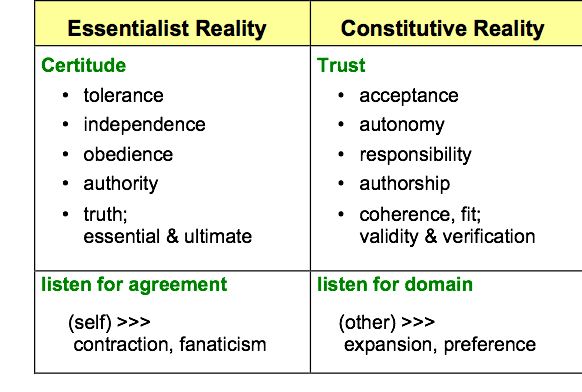an invitation ... which path?




when is it a choice?
What is choice? Choice happens in language, when one can distinguish at least two alternatives, and then step back from these to consider your own feeling with respect to each. I say “feelings” though we may describe the feeling as “our integrity” or “our duty” or “our preference” ... in other words we rationalize our own emotions, and sometimes find that some more subtle emotion, such as our desire to remain coherent with out beliefs, outweighs the apparent attraction or promised pleasure of one or other choice.
The ethical concerns we have in making choices are discussed on another page. For now, I will consider how it is we find ourselves on one path or reality or another, and what happens to our possibility of choice when we see that there are alternatives with consequences - to ourselves, to those we care for, or our worlds.
Bunnell, P.
Reflections on the Ontology of Observing.
Note that this publication is not intended as an interpretation of Maturana, but rather as my own way of understanding, for myself, some aspects of his work.



single ultimate Reality
multiple realities
In the following table I have created a series of distinctions, as people often do in tables; where somewhat parallel ideas appear entirely different depending on which ontology and its attendant Reality or realities one accepts.
These distinctions are intended as evocations, not as some analytic difference. How one lives a reality depends on the emotion of how one lives it, and how one treats others with different realities.
metaphysics, consciousness and the notion of probability
When Aristotle wrote about Metaphysics he was saying something about speaking beyond his other writings, those that he had called Physics. It is in that sense that I said that what I was writing was a Metaphysics, because I was writing something that was beyond modern physics.
We living being are not physical entities, we are biological entities, and the physical domain arises as we explain the operational-relational coherences of our living with the operational-relational coherences of our living. This is why many speculations in the field of quantum physics, where some physicists attempt to talk about matters of life, mind, consciousness and spirituality, are not and cannot be adequate because they talk about consciousness as if it were a happening in the physical domain, and is not. Consciousness occurs in the relational domain of human coexistence as a reflective conversation in which we recursively distinguish ourselves distinguishing ourselves.
Moreover the notion of probability occurs as a reflective invention that permits us talk about what we think may happen in a domain of structural coherences which we cannot describe but which we consider not to be chaotic. Thus, probability is a cognitive notion that permits us to act with trust in our understanding in a domain of structural coherences which we cannot fully describe. In other words probabilities measure our trust in structural determinism in a domain that we implicitly treat as structure determined, while we say that it is not.
Maturana, 2012
